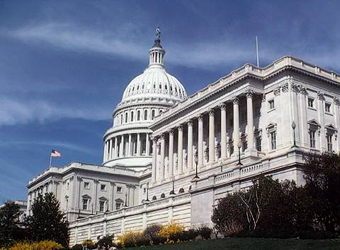Following the US Secretary of State John Kerry’s short visit, a US Congressional delegation from the subcommittee on State-Foreign Operations, led by Senator Anne Marie Chotvacs has arrived in Cairo on Tuesday morning.
Egyptian senior sources with knowledge of the visit stated that the US Congressional delegation is set to meet with a number of high-profile officials in the country to tackle the US assistance program in Egypt within the upcoming period as “one of the prompt results of Kerry’s visit” alongside to discuss the recent developments in the country.
The delegation will be reviewing the military-led interim government’s seriousness and preparations to carry out the roadmap, including holding a referendum – after drafting the amended constitution; as well as the parliamentary and presidential elections, the source who receive the US delegation further added.
Following the visit, the delegation is set to present a comprehensive report on the ongoing situation in Egypt in order to be presented to the US Congress.
US Aid Conditions
Moreover, the sources said the State-Foreign Operations Subcommittee had proposed a bill that would see $1.3 billion of military assistance split into four sections, with conditions placed on 75% of the aid. The proposed bill will provide “$ 250 million in economic and $1.5 billion in military assistance,” as per President Barack Obama’s request. The subcommittee proposed the military assistance be split into four equal portions and be “subject to certifications by the Secretary of State.
The first 25% will be “provided immediately”, while the second is on the condition “that the government of Egypt is supporting inclusive political processes and releasing political prisoners.” The US recently called for the release of political prisoners, including former president Mohamed Morsi. The bill allows for a “national security waiver” of this condition.
The third portion meanwhile “is conditioned on a democratic election and a new government being in place.” The national security waiver is also available for this condition. The fourth has no waiver available and is dependent on “the newly elected government governing democratically and taking steps to protect the rights of women and religious minorities.”
Kerry’s Visit
Last Sunday, the US Secretary of State John Kerry made a brief stop in Cairo, where he said America was a friend of the Egyptian people and committed to contributing to Egypt’s success.
At a press conference, Kerry said the relationship between the US and Egypt is “very important” and added that whatever happens with the North African country’s current political instability is “profoundly important” to the Middle East and the interest of the United States.
Kerry’s visit was his first since the Egyptian military’s removal of Mohamed Morsi in July, which was followed by a harsh crackdown on his protesting supporters that led the U.S. to suspend hundreds of millions of dollars in aid.
Egypt is receiving billions of dollars in aid from wealthy Gulf Arab states such as Saudi Arabia and the United Arab Emirates. But Egyptian authorities reacted angrily to the US aid suspension, declaring it a new low point in ties that have been strained since the popular revolt that unseated authoritarian leader Hosni Mubarak in February 2011.
Since the ouster of former President Mohamed Morsi on July 3, both the Democrat and Republican parties are deeply divided on the stance to adopt with regard to Egypt.
President Obama has cancelled joint military exercises and delayed the delivery of F-16 fighter jets to Egypt but has so far refrained from publically denouncing Morsi’s removal as a coup.



